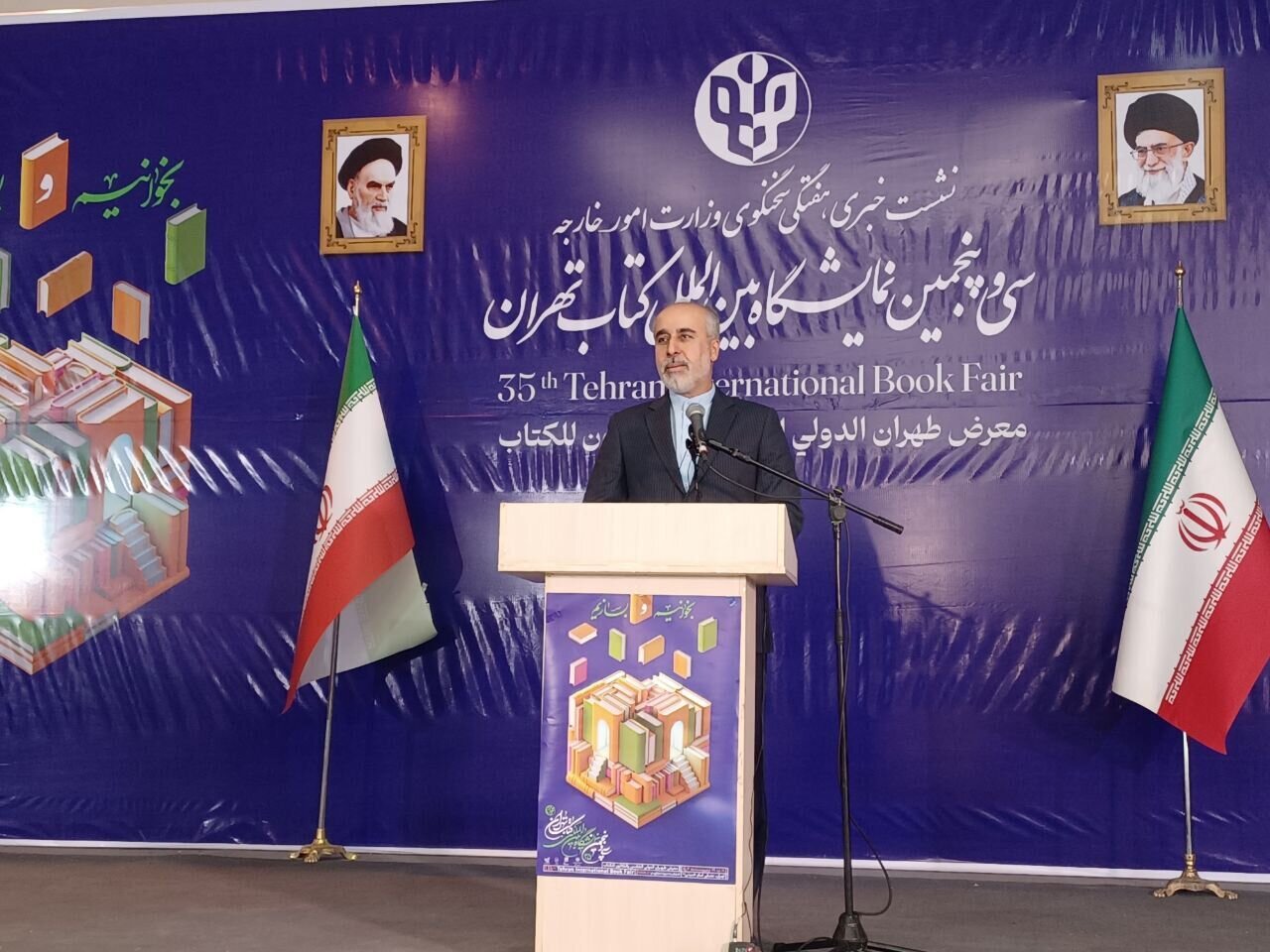No change in Iran nuclear doctrine: Foreign Ministry

TEHRAN- The spokesperson for the Foreign Ministry stated that Tehran has both the fatwa of the Leader of Islamic Revolution as stating the prohibition of inhumane weapons based on the Islamic religion and does believe that these weapons pose a threat to the global community.
During his weekly presser on Monday which was held at the Tehran International Book Fair venue, Nasser Kanaani said that Iran has not made changes to its nuclear doctrine.
He also said that in the West Asia region, only the Zionist regime is not a party to the NPT.
He continued that Iran’s official positions on weapons of mass destruction have been repeatedly stated through Iran’s high-ranking officials, and no changes have been made in Iran’s nuclear doctrine.
He said that the Islamic Republic of Iran has taken various actions in various political, legal, and international areas, the dimensions of which are evident to the global community.
Palestine virtual embassy
Kanaani added that the diplomatic apparatus has taken action in the legal, consular, and executive areas to implement the law passed by the parliament regarding the establishment of a virtual Palestinian embassy.
Consultative opinions have also been obtained from the Palestinian embassy in Tehran and resistance groups. This virtual embassy has been established experimentally in the Foreign Ministry system to better examine its technical problems and other dimensions.
The spokesperson also stated that developing bilateral relations with neighboring and Arab countries in the region and creating a positive and constructive atmosphere in two and multilateral talks with neighboring and Persian Gulf countries require taking complementary steps to enhance the level of multilateral cooperation, which has various commercial, economic dimensions and a security-oriented approach within the framework of ensuring common security for regional countries.
Barzani expresses commitment to security pact between Iran, Iraq
Regarding the visit of Barzani, the head of the northern region of Iraq, to Iran, Kanaani added that given that the visit took place last week, it is necessary to mention that one of the fundamental policies of the thirteenth government is the development of comprehensive and constructive relations with neighboring countries in the framework of Iran’s neighboring policy, and Iraq, due to the extent of its shared interests with Iran, is of special importance to Iran.
The spokesperson noted that the relations between Iran and the northern region of Iraq have always been friendly, and there have been and continue to be deep connections between the two sides.
He continued by saying that standing against the Daesh in Iraq was another area of common cooperation between the two sides. Explicit negotiations were raised during the visit, and constructive and positive discussions took place.
Kanaani added that regarding the security of the common borders of Iran and Iraq, Iran will not allow any insecurity, and will confront any insecurity while saying that Mr. Barzani also expressed commitment to the security of Iraq and Iran.
India takes steps in developing ties with Iran
The spokesperson said that the experience has shown that countries are willing to establish foundations for common interests with independent countries, including Iran, disregarding unilateral U.S. sanctions. The agreement between Iran and India on the development of the Chabahar port, with India’s understanding of the nature of unilateral U.S. sanctions, has been implemented and is not limited to India alone.
“Extensive relations and cooperation with Iran show that U.S. sanctions are not deterrent to countries interested in maintaining their political independence and cooperating with Iran,”
He continued that the Indian government is also taking steps in developing its relations with Iran without considering illegal U.S. sanctions. America should distance itself from sanctions considering the existing realities.
Iran, IAEA continue discussions to resolve remaining issues
The spokesperson highlighted that Tehran hopes to continue constructive interaction with the IAEA while considering the principle of impartiality on the part of the Agency.
Our discussions to resolve remaining issues continue, and during Grossi’s visit, both sides agreed to continue their negotiations, he said.
He continued that whenever the Director-General of the IAEA acts technically, issues between the two sides progress well, but when a political approach is taken, technical issues deviate from their main path.
New countries emerged to support anti-Israeli actions of South African govt.
Regarding Libya’s intention to file a complaint against the Zionist regime and Iran’s decision to join as a third party, Tehran has expressed political support for the South African government’s initiative to bring a case to the International Court of Justice and encouraged other countries to support South Africa’s honorable action.
Kanaani also said that “fortunately, we are seeing an increase in new countries declaring political support for the actions of the South African government, with these new countries stating that they will join in this initiative.”
The spokesperson underscored that “Iran politically supports such complaints, but in terms of Iran’s entry as a recognized country, we naturally have our own specific legal approach and considerations in the matter of not recognizing the Zionist regime. Iran supports all honorable actions taken by governments.”
He said that naturally, Iran considers any interventionist remarks by the authorities of these countries in Iran’s internal affairs, including Iran’s legal cases, as unacceptable.
Kanaani concluded by stating that “our diplomatic negotiations with the American side are being conducted through intermediaries and within the framework of lifting sanctions, which has been ongoing so far.”
“Iran has repeatedly stated that it is committed to a political and negotiation-based approach to achieve the lifting of unjust sanctions, and as long as this approach secures Iran’s interests, we will continue to move forward within the framework.”
Leave a Comment